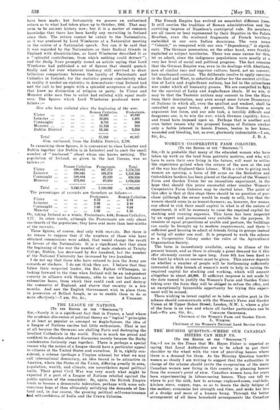THE LEAGUE OF NATIONS.
[To THE EDITOR OF THE " SPECTATOR.") SIR,—Surely it is a significant fact that in France, a land where the academic discussion of political theory on "logical "'principles is at least as popular as amongst us Anglo-Saxons, the idea of a League of Nations excites but little enthusiasm. That is not at all because the Germans are shelling Paris and destroying the loveliest Cathedrals in the world. Paris is much too proud and confident to abandon abstract discussion merely beeause the Roche confederates furiously rage together. There is perhaps a special reason why the notion of a League should have a particular appeal to citizens of the United States and ourselves. It is, rightly con- sidered, a scheme (perhaps a Utopian scheme) for what we may call international democracy, an idea bound to be attractive in America, where the States of the Union, differing greatly in area, population, wealth, and climate, are nevertheless equal political units. Thoir great Civil War was very much what might be expected if a part of a League of Nations rebelled against the public opinion of the remainder. So, again, the British Empire tends to become a democratic federation, perhaps with some sub- conscious hope.of thus ultimately satisfying the demands of-Ire-- land and, in due course, the growing political self-consciousness Ind self-confidence of India and the Crown Colonies. The French Empire has evolved on somewhat different lines. It still carries the tradition of Roman administration and the surviving impress of Napoleon's centripetal rule. Its members are all (more or less) represented by their Deputies in the Palais Bourbon, even the • ecattered fragments of French territory embedded in our own Indian dominions. The very name " Colon*" as compared with our own "Dependency," is signifi- cant. The German possessions, on the other hand, were frankly _exploited as subject territories. There was some excuse for this, let us admit, since the indigenous populations were mostly at a very low level of social and political progress. The fact remains that the German Empire was, even in its dealings with Alsatians, men of similar race and superior culture, based, not on consent, but unashamed coercion. The deliberate revolve to apply coercion in the East and West, to substitute Kultur for the ancient civiliza- tion of Latin and Anglo-Saxon nations, has led to the calamitous war under which all humanity groans. We are compelled to fight for the survival of Latin and Anglo-Saxon ideals. If we win, it may be that the Teutonic nations may consent to free the Slays from their domination, may even accept some future Democracy of Nations in which all, even the smallest and weakest, shall be consulted on equal terms. At present, the Teuton accepts no argument but force, and our sole task, a terribly difficult and dangerous one, is to win the war, -which German cupidity, force. and fraud have imposed upon us. Perhaps that is another and even better reason why the proposed League of Nations awakes only a feeble interest 'in -heroic France, beaten to her knees, wounded and bleeding, but, as ever, gloriously indomitable.—I am,


























 Previous page
Previous page